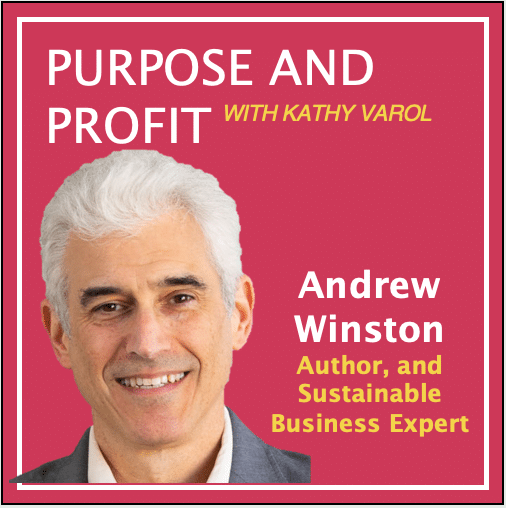Show Notes:
Andrew Winston is one of the most widely read and respected writers on sustainability. The author of four books and hundreds of articles. In addition to his writing, Andrew has advised multinationals such as HP, Ingersoll Rand, J&J, Kimberly-Clark, Marriott, PepsiCo, PwC, and Unilever. In 2021 he was named a top 50 management thinker in the Thinkers50 list.
Andrew’s latest book is, Net Positive: How Courageous Companies Thrive by Giving More Than They Take. It was co-authored with Paul Polman, the legendary ex-CEO of Unilever. This book is a must-read.
In this episode we discuss:
✅ What Net Positive means and why it’s crucial for business
✅ How ESG got tied up in American Politics
✅ The difference between ESG and Sustainability
3 episode takeaways (listen to the full episode for a lot more gems!):
1️⃣ There’s a big difference between the ambition of 1) minimizing the damage your company causes to humans and the planet, versus 2) becoming neutral, and causing no harm, versus 3) making the world better through your operations.
Where we set our ambition anchors our thinking (in psychology this is referred to as the anchoring effect). In business, we create company ambitions to anchor the entire organization and orient employees in the same direction. The ambition you set will determine how inspired your organization is to reach it, the types of innovation they develop to attain it, and ultimately your ambition will influence how far you go.
Take a look inside your organization. Where have you set your ambitions? What are you anchored against?
***
2️⃣ ESG and Sustainability are not the same things.
ESG, at its most fundamental level, was created to assess the risk of investments, mainly by understanding how the future of a business could be affected by environmental and social issues. It includes an additional lens on whether a company has good governance in place to manage those risks.
Sustainability, on the other hand, looks at how a company impacts the world and society, not limited to the lens of business risk.
***
3️⃣ As humans, we have a cognitive bias toward hiring people similar to ourselves. We also know from sound research that diversity makes the strongest teams. How can we help overcome our cognitive bias in hiring?
Next time, before you start interviewing to fill vacant spots on your team take a moment to do this visualization. Close your eyes and imagine your workforce filled with clones of you. Honestly assess: what you would be good at and what are your known weaknesses and blind spots. Then mentally scan each of your current team members to determine which of your strengths are reinforced, and which of your weaknesses are compensated by them. Now you know what you and your team already bring to the table, and more importantly, what’s missing that a new hire could offer.
Knowing this will help intentionally shift your focus from the common “culture fit” question, which is often a disguised way of asking “is this person like me and do I want to be friends with them”, to instead asking “is this person adding to our Super Hero Marvel Team, bringing what none of us have to the team?”
References:
- Connect with Andrew on LinkedIn
- Andrew’s website
- Net Positive: How Courageous Companies Thrive by Giving More Than They Take by Andrew Winston and Paul Polman
- Paul Polman’s website
- “ESG Is Going to Have a Rocky 2023. Sustainability Will Be Just Fine.”, MIT Sloan Management Review, February 7th, 2023
- “2022: A Tumultuous Year in ESG and Sustainability”, Harvard Business Review, December 21st, 2022
- Learn more about Edelman’s research and reports on trust here.
- You can read BlackRock CEO Larry Fink’s most recent letter to investors here.

